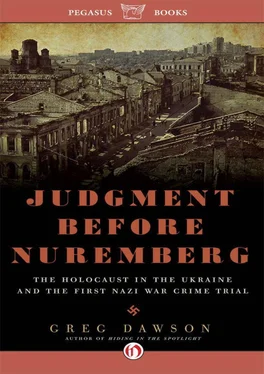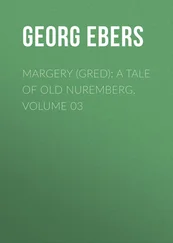I recalled the black-and-white photographs I’d seen at the Kharkov Holocaust Museum of the hangings, and tried to imagine this place sixty-seven years ago without the big commercial buildings and the McDonald’s on the corner. Yes, I thought, this could be the place.
Sergy parked in what looked to be an actual, if unmarked, space next to other cars, then went off to speak to a man in a uniform twenty feet away who had gestured to him. When he did not return after fifteen minutes, Yuri went to investigate and found Sergy in the front seat of a police car shuffling through papers. He returned holding a $25 ticket for some invisible violation.
“Classic Ukrainian justice,” Yuri said, smiling ruefully. He had little doubt in whose pocket the $25 would end up. I laughed. “Classic Chicago justice.”
The violations of Bulanov and the three Nazis were impossible not to see, and the Ukrainian justice they received—perhaps in this square—was a small down payment for incalculable crimes.
Daylight was fading quickly—it would be dark by four o’clock. The first neon signs were flickering on as Sergy guided the cab out of the marketplace through the wintry gloom.
No matter how many memorials were built and plaques posted in Kharkov, I thought, staring out the window, it would never be enough, the numbers were too great. There would always be an army of unrequited ghosts, in the forests and alleys and shadows of old garages—ghosts in search of sanctuary and a single fleeting moment of recognition by the living that they, too, had once been here.
Before 2009, when I began appearing before strangers to promote Hiding in the Spotlight, my mother’s Holocaust biography, I was never self-conscious about the fact that I knew almost nothing of her amazing story until I was thirty years old, and that I was a teenager when it first dawned on me that I was actually Jewish.
I remember the looks of shock and disbelief from the audience the first few times these facts slipped out during question-and-answer periods. You would think I had told them I was thirty before I discovered my left hand, or that I was a teenager before learning the truth about Santa Claus.
“Wait!” they would say. “You were THIRTY?”—making it sound like ONE HUNDRED THIRTY.
“Well,” I would explain sheepishly, “I was never told. And frankly I never thought to ask. My only religion growing up was Hoosier basketball. I’m sorry! Please feel free to leave right now.”
People are kind—so far no one has walked out—but I remain very self-conscious about being possibly the most clueless second-generation Holocaust survivor in the world, or so it feels every time the facts come out and jaws drop across the room. This is why it was such a moment of relief and validation for me when Rabbi Moshe Moskovitz let slip the information that he—chief rabbi of Kharkov—knew almost nothing of his father’s Holocaust experience until he was thirty and had been chief rabbi for five years.
“I always knew he was in Auschwitz and a survivor, but nothing more,” the rabbi told me in his office in the beautifully restored synagogue on Pushkinskaya Street. “He didn’t talk about the details until the Spielberg interview with him.”
Like my mother, the Rabbi Moskovitz’s father, Nissan, broke his virtual silence to be interviewed for The Shoah Project, filmmaker Steven Spielberg’s effort—launched after the phenomenal success of Schindler’s List —to seek out and preserve survivor stories before the fastapproaching day when all the subjects will be gone. Born in 1965 in Venezuela, Rabbi Moskovitz represents a reverse Diaspora of Ukrainian Jews, returning to the land his father left in Nazi chains.
Nissan Moskovitz was thirteen when the Germans arrived in his hometown of Chumayev near Khust in far western Ukraine. “We don’t know the date,” the rabbi told me, but it likely was 1942 or later because the Jews of Chumayev were shipped to Auschwitz instead of being shot and buried on the edge of town—the Nazi method early in Operation Barbarossa, before Auschwitz was in operation. At Auschwitz, the Moskovitz family endured the waking nightmare of instantaneous dissolution—an agony unique to the Holocaust.
“His mother and younger siblings were sent straight to the left to the gas chambers and he was taken to the right line to work,” the rabbi said of his father. “Until the end of the war, he went from camp to camp until they were freed by the Russians. After the war he met up with his father, who also survived, in Budapest. From there he went to London and then to Colombia. My mother was in Venezuela, also a survivor. We knew my father was a survivor, but he never spoke of it. At home we always discussed the Holocaust, and he was always quiet with his red eyes. He’s very religious, a big believer, even though when you hear his story, what he went through—how do you keep your faith? How do you even believe in people? It doesn’t work rationally.”
After short-term stints at synagogues in South America, Mexico, and the Caribbean, Moskovitz, then twenty-five, was named chief rabbi in Kharkov in the summer of 1990—an historic moment for Kharkov Jews. Only weeks before, Soviet President Gorbachev had officially returned the great domed synagogue, built in 1913 and closed by the Communists in the late 1920s, to the Jewish community of Kharkov. It was the first shuttered synagogue in the Soviet Union to resume its original purpose after being used as a secular playground for decades. Moscow authorities had even turned it into a sports complex at one point.
“The sports complex was in the actual synagogue building,” the rabbi said. “They added a floor in the main sanctuary so that football and basketball could be played at the same time. When we received the synagogue back in August 1990, the Olympic symbols from 1980 were still on the windows and the walls, and the additional floor was still there. All the other synagogues in Kharkov were no longer functioning. Meshansky synagogue was burned many years ago and in its place is a factory. The Chebotarsky 17 synagogue was returned to us in 1998—it had been used as a traffic police station—now we use it as a dormitory and yeshiva. Another synagogue is now used as a planetarium.”
Kharkov’s Jewish population, about 30,000, is a fraction of what it was before the war, but a much larger fraction than for cities in western Ukraine where the population had less warning—in most cases none —of the Nazi advance and its attendant atrocities. Kharkov’s pre-war Jewish population was around 135,000, and most fled east to the Urals before the Nazis arrived in October 1941, in contrast to many towns and cities to the west where nearly all the Jews were murdered in the first months of Operation Barbarossa. Writing after the Soviets had pushed the Nazis out in 1944, Vasily Grossman, a Jewish journalist working for the Red Army, lamented that “there are no Jews left in Ukraine”—only a slight exaggeration.
If people at my book events were dumbfounded by what I did not know about myself, I was dumbstruck at what they collectively did not know about the Holocaust in the East, which served as the backdrop for my mother’s story. And keep in mind, except for classrooms of captive students, these were self-selected audiences with, presumably, an above-average knowledge of the subject. Who could imagine that I would find the same dearth of knowledge at ground zero of the story itself—Ukraine.
“You would be surprised to know how little people know, even here,” Rabbi Moskovitz told me. “When we came in 1990, on the small monument at Drobitsky Yar the word ‘Jewish’ was not mentioned at all. Even people here who wrote history about what happened never wrote about the Jewish Holocaust in Ukraine. And the sad part is, even today in Ukraine the children, our youth, don’t know about the Jewish Holocaust. They know about the war between the Red Army and the Germans, the ones who are scholars. But if you go out on the street to ask about the Holocaust, not many people know about it.”
Читать дальше












